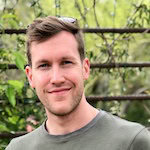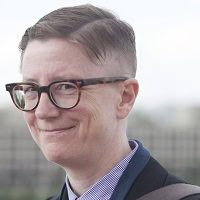The AHA is pleased to announce this year’s summer columnists. Follow along as these graduate students write about their scholarship, research, and work experiences this summer!
James Parker, “Water Waste: How Colonialism Affected Kenyan Resources”

James Parker
None of the issues facing the Global South due to climate change is perhaps more urgent than the disappearance of freshwater in rural landscapes. As journalist Steven Solomon wrote in 2009, the wars of the future may well be fought over water, and for many communities, this resource is a pressing concern today. But water shortages have been part of the past, too, subject to decades of conflict and negotiation between rural populations on the one hand and state or international forces on the other.
“Water Waste” will take the semi-arid regions of eastern and northern Kenya during the second half of the 20th century as a case study to show one example of this dynamic, with implications for today. In my first post, I will discuss how the colonial state in Kenya used water as a tool to overcome the supposed limits of the rural landscape. After the Second World War, the colonial government needed to open up new lands for production, particularly in the semi-arid plains of eastern Kenya, to spur economic growth. But instead of working with tribal peoples who had knowledge of the landscape, the state imposed modern irrigation projects on the area, fundamentally altering the environment. The resulting changes left a long legacy.
Water development projects also acted as tools of statecraft, as my second post will show. The colonial government in Kenya attempted to expand its tenuous grip on power in arid Northeastern Kenya, where irrigation projects—with their infrastructure, “expertise,” and regulations—were to impose colonial rule. State officials imagined these regions populated by ideal agricultural subjects practicing plantation agriculture, yet in actuality the projects served to dispossess and marginalize native inhabitants in favor of more mobile populations from the Central Highlands. In this case, development projects perpetuated internal social and economic divisions, increasing the precarious existence of certain communities.
The communities of rural Kenya have long managed their approaches to irrigation and production. By demonstrating how such vital resources have been manipulated to benefit the few rather than the many, historians can make public the inequities of resource use in the past and provide essential corollaries for policies of the future. These long-term historical roles of state power, capital, and rural resistance must form a central part of modern-day resource management.
James Parker is a PhD candidate in world history at Northeastern University. His research encompasses the British Empire, the history of development, and environmental history. His dissertation, “The Fluidity of Late Colonialism: Irrigation, Development, and Control in Kenya, 1940–1963,” analyzes the social and environmental consequences of the colonial state’s attempts to extend irrigation in rural areas, as well as the diverse responses of affected communities.
Acadia Roher, “By the People: Putting the Public in Public History”

Acadia Roher
Because the histories of communities with a relative lack of political power in the United States—including communities of color, women, working-class people, rural people, indigenous people, disabled people, and queer or trans people—can be difficult to access through traditional archival documentation, public historians must be creative in working with them. Many archives, museums, and universities are reevaluating their approaches to preserving and sharing materials from these communities, through oral histories, for example, or collaborations with religious institutions, civic organizations, and grassroots groups. Instead of simply extracting information, public historians must work with groups whose own narratives have been ignored and repressed. How do we do this work without unwittingly increasing the power of established institutions?
“By the People” will explore how public history practitioners can work with marginalized communities to shift power in producing and disseminating their historical narratives. The first column will introduce a process under development by the Arkansas People’s History Project and explore the pathways others are creating for community-based and participatory public history across the United States and Canada. The second column will demonstrate how the Arkansas People’s History Project is building on these democratic experiments to reimagine documentation, research, media production, and sharing the history of the early years of the Women’s Project, a multiracial feminist organization founded in Arkansas in 1980.
I plan to examine nontraditional archive work like that done by the Freedom Archives and Archives for Black Lives; oral history projects such as Groundswell and the NYC Trans Oral History Project; “museums without walls,” such as Museo Urbano and the Toronto Ward Museum; and podcasts that highlight these approaches and histories. Through these examples, I will bring unique insights, inspiration, and critique to readers.
Acadia Roher is a first-year graduate student in public history at the University of Arkansas at Little Rock. She grew up in Little Rock and New Orleans, Louisiana, and has degrees from Barnard College and the Clinton School of Public Service. Her love for the South shines through in her lifelong commitment to working for environmental, racial, and economic justice in Arkansas. Outside of school, work, and organizing, you can usually find Acadia helping out at a community garden, swimming in a creek, or visiting a cemetery to solve genealogical mysteries.
Samantha Stearns, “Why Social Studies Education Needs Professionalization”

Samantha Stearns
If you were to ask a typical American high school student, “Why study mathematics?” or perhaps “Why study science?” they would probably answer that these subjects are foundational to becoming part of a respected profession, such as engineering or medicine. But if the same question was posed about social studies, I am unconvinced that most students would be able to answer. My column, “Why Social Studies Education Needs Professionalization,” will help historians and scholars in higher education understand the diminishing role of social studies in schools, and present solutions to teachers who are struggling in their schools to create buy-in for the importance of social studies curriculum.
I stress professionalization because social studies teachers are often seen as “fillers”: they often need to hold dual certification in order to get a teaching position and often have to teach multiple subject areas. This is the updated, 21st-century version of the stereotypical “all history teachers are coaches” stigma of yesteryear. Unfortunately, having to fulfill multiple roles inevitably leads community members, students, and sometimes teachers themselves to view social studies as a nonessential part of a child’s education. Professionalizing social studies education, to me, means developing teachers as content-area experts and providing them with tools and strategies in order to foster historical-thinking skills in their students. By training students in the actual craft of social sciences, we can legitimize social studies education and foster student engagement in all subjects.
Why and how did the American education system turn against the importance of history, geography, and civics? This question fuels my passion for quality social studies education and has consistently made me a better teacher as well as an advocate for the importance of social studies within a child’s educational program. Through my column, I hope to spark a broader conversation about the status of social studies education and to present solutions to individual teachers dealing with the decline of social studies education in the American classroom.
Samantha Stearns is an eighth-grade social studies teacher at Roosevelt Middle School in River Forest, Illinois, and a graduate student in Indiana State University’s history department. She graduated magna cum laude with a bachelor’s degree in history and secondary education from the University of St. Francis. In addition to teaching social studies, she sponsors a service club for the school’s upperclassmen, the Mock Trial club, and the History by Hollywood club that encourages students to consider how film can have an impact on historical narratives.
This work is licensed under a Creative Commons Attribution-NonCommercial-NoDerivatives 4.0 International License. Attribution must provide author name, article title, Perspectives on History, date of publication, and a link to this page. This license applies only to the article, not to text or images used here by permission.


